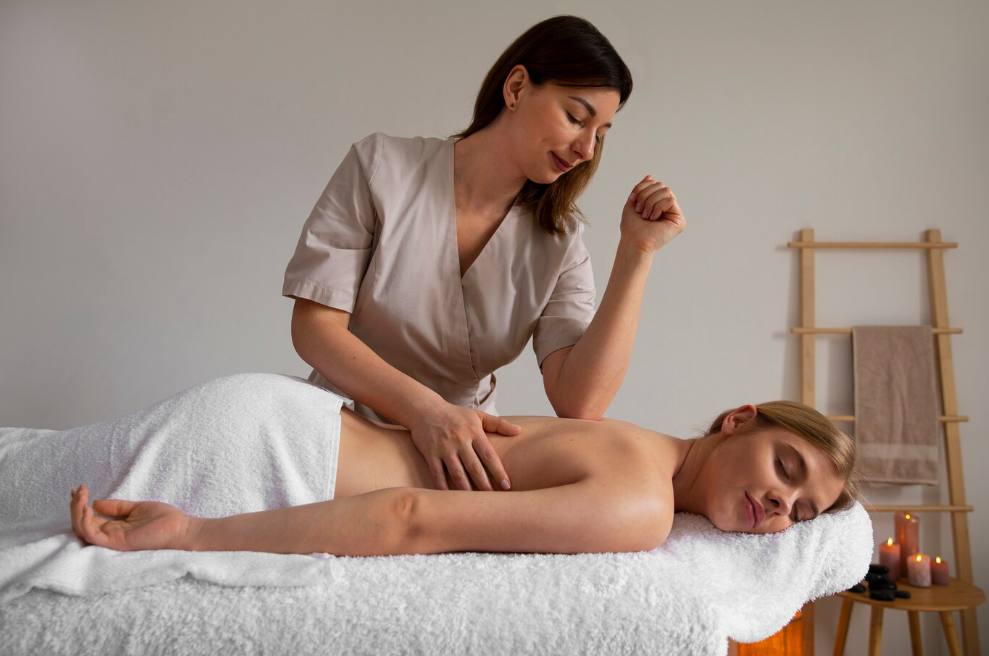Table of contents
- Are You Allergic to Any Massage Oils or Lotions?
- Tell Us About Any Past Injuries or Surgeries
- How Do You Use Your Body Day-to-Day?
- What Are Your Goals for This Massage Session?
- Are You on Any Medication That May Affect Your Sensitivity to Pressure?
- Are You Currently Pregnant?
- Have You Taken Any Pain Medication Recently?
- Are You Taking Any Other Medication?
- What Music Do You Want To Listen To?
- Conclusion
- FAQs: Common Questions Answered
So you’ve booked a massage in Vancouver to relax and relieve tension – fantastic! As your massage therapist prepares to work their magic, there are a few things they need to know to customize your session and ensure your safety and comfort. Before you arrive, take a few minutes to think through these questions.
Are there any areas of chronic pain or old injuries the therapist should know about? Do you have any allergies or sensitivities to essential oils or lotions they should avoid? How would you describe your typical daily activities and posture? The more information you can provide about your lifestyle, sensitivities, and goals for the massage, the better equipped your therapist will be to release your tight spots and help you unwind.
With the right details, your massage can be tailored to your unique needs. So let us find out the crucial things your massage therapist wants to know before treating you.
Are You Allergic to Any Massage Oils or Lotions?
Before your massage begins, your therapist will ask about any allergies or sensitivities you may have to essential oils, lotions or massage oils. This is important for them to know so they can choose products that will be soothing and relaxing, not irritating. If you have sensitive skin or known allergies, speak up. Don’t worry; there are hypoallergenic options available.
1. Medical Conditions and Injuries
Let your massage therapist in Vancouver know about any injuries, surgeries or pain conditions you’re dealing with. A massage can be therapeutic, but the therapist needs to know your physical issues in order to avoid problem areas and tailor the treatment. Discuss how these conditions impact your daily life and movement. The more detail you can provide about past or present medical issues, the better.
2. Your Typical Activities and Posture
How you spend your days impacts your body. Whether you sit for long hours, are constantly on your feet, do repetitive motions, engage in heavy exercise or a combination, share the details with your therapist. They can then focus on areas that need the most attention and care based on your lifestyle demands. Mention any hobbies or sports you participate in as well.
3. Your Goals for the Massage
What are you hoping to achieve from your massage session? Reduced tension in your back and shoulders? Relief from chronic headaches? Improved flexibility and range of motion? Be clear about your goals, and the therapist can cater the massage techniques, depth of pressure, and focus to meet your needs. Discuss how often you think you may need massage therapy to maintain benefits.
With open communication, your massage therapist in Vancouver can develop a treatment plan to maximize the results and leave you feeling balanced, rejuvenated and reconnected with your body. The time you invest in providing details will be well worth it.
Tell Us About Any Past Injuries or Surgeries
When you book your massage, be sure to provide some important information to help your therapist customize the perfect treatment.
Past Injuries or Surgeries
Let your therapist know about any past injuries, accidents or surgeries you’ve had, especially if they still affect your movement or cause pain. For example, if you’ve had a knee replacement or back surgery, your therapist will want to know so they can properly support those areas and avoid irritating them. Don’t keep these details to yourself – the more we know about your body’s history, the better we can help you.
You should also mention conditions like arthritis, fibromyalgia or muscle strains. Therapists are trained to adapt their techniques to work with and around these issues. We want to relieve your pain and tension, not make these conditions worse!
Be specific about any areas you want the therapist to focus on or avoid. If a past injury to your shoulder or hip still acts up, point that out. Therapists rely on your guidance to treat you safely and effectively. The open communication will lead to a massage tailored just for you.
Letting your therapist know about the ways you typically use your body can also help. For example, if you frequently sit while working at a desk or computer, that can lead to tension in the neck, shoulders and lower back that your therapist will want to address. Mention any hobbies, exercise routines or physical jobs you have so the right areas can be focused on.
The more details you provide about your physical health and lifestyle before the massage, the more customized and E beneficial your treatment can be. So speak up – your therapist is there to listen and help in any way they can!

How Do You Use Your Body Day-to-Day?
Do you have an active job or hobby that requires repetitive movements, like typing, lifting, or standing for long periods? Let your therapist know about any physical activities so they can focus on areas that may be tense or sore. For example, if you’re a runner or avid gym-goer, your legs and hips may need extra attention. If you work at a desk for most of the day, your shoulders and neck are likely problem spots.
How do you position your body when sitting or lying down? For example, do you habitually cross your legs or sleep on your side with your arms overhead? These positions, especially if done frequently over long periods, can create muscle imbalances that a massage therapist will want to address. Mention any poor posture habits so your therapist can suggest some simple corrections and provide relief for affected areas.
What are your stress levels like? Chronic stress takes a major toll on the body and can manifest in tight, painful muscles. Be open about your stress levels so your massage therapist can focus their efforts where you need it most. Techniques like trigger point therapy or myofascial release can help relieve stress-related tension.
The more details you provide about how you use and position your body each day, the better equipped your massage therapist will be to target problem areas and tailor a treatment plan specific to your needs. An open and honest conversation about your daily habits and activities will allow them to address muscle tensions, relieve pain, and promote an overall sense of relaxation during your massage.
What Are Your Goals for This Massage Session?
When you book a massage, your therapist wants to make sure it’s tailored to your needs. Before the session begins, they’ll ask you some questions to determine how best to treat you. Be open and honest in your answers—it will lead to a better experience.
One of the most important things for your massage therapist to know is what results you’re hoping to achieve from your session. Are you looking to relieve tension in your lower back? Release tightness in your shoulders? Simply relax and destress? Let your therapist know your goals up front so they can focus their efforts accordingly.
Maybe you have chronic pain in a certain area or an old injury that’s still bothering you. Inform your therapist about any problem areas or past traumas so they can properly assess the situation and determine an appropriate treatment plan. They can adjust pressure and technique based on your sensitivities. The more details you provide about your physical condition and medical history, the more customized your massage can be.
If there are any parts of your body you do not want to be massaged, speak up. Your comfort and consent are top priorities, so feel free to place any area off-limits for any reason. You should leave a massage feeling better than when you arrived.
Are You on Any Medication That May Affect Your Sensitivity to Pressure?
Let your therapist know if you’ve taken any painkillers recently so they can be mindful of how your body may respond. The same applies if you have any allergies to common massage oils or lotions. Your safety and well-being are the number one concern.
An open and honest conversation with your massage therapist before starting your treatment will lead to an experience tailored specifically to you. Be clear about your needs, concerns, and desired results. Relax—you’re in good hands. Your therapist wants this time to be all about you and make sure you walk away feeling your best.
As your massage therapist prepares for your treatment, they will likely ask you a few questions to ensure your comfort and get the most out of your session. Be open and honest in your answers. Are there any areas you want us to avoid during the massage? Are there any parts of your body that are overly sensitive or that you prefer not to be massaged? Speak up!
Your massage therapist’s goal is to relieve your tension and pain, not create more. Don’t be shy about telling them to avoid massaging areas that make you uncomfortable.
Some common sensitive areas are:
- Face and scalp
- Feet
- Glutes
- Inner thighs
Let your massage therapist know about any recent injuries, surgeries, or areas of chronic pain. They can adjust the massage to avoid aggravating these spots. The more details you provide about your medical history and sensitivities, the better equipped they will be to give you an enjoyable and effective treatment.
You should also tell your massage therapist if you have any allergies or sensitivities to common massage oils and lotions. Most practices use natural ingredients, but it’s always best to double-check. Don’t be afraid to ask them for an alternative if the product they usually use could cause you irritation.
With some advanced notice, your massage therapist may be able to source specialized products that cater to common allergens like nuts or gluten. They want you to leave feeling rejuvenated, not with a rash!
Being upfront about any areas you want avoided and your product sensitivities will ensure you get a massage tailored perfectly to your needs. You’ll be able to relax knowing your massage therapist can give you a soothing experience from head to toe—minus any spots you specify, of course! Communication and comfort are key.
Are You Currently Pregnant?
When booking your massage, be upfront with your therapist about any factors that could affect your treatment. One of the most important things they need to know is whether you’re currently pregnant. Massage during pregnancy requires special precautions to ensure the comfort and safety of both mother and baby.
If you’ve recently found out you’re expecting, congratulations! Now is the time to find a therapist specifically trained in prenatal massage. They know how to properly support and position your body using pillows and bolsters as your belly grows. They can also show you self-care techniques to relieve common discomforts like back pain, leg cramps, and swelling.
It’s best to wait until at least your second trimester before receiving massage treatment.
The first 12 weeks are when major development is happening, so it’s safest to avoid any stimulation that could potentially disrupt that. After week 13, prenatal massage done by a certified therapist is safe and beneficial for the vast majority of pregnancies. However, for some high-risk pregnancies, massage may need to be avoided altogether, depending upon your doctor’s recommendation.
When you go in for your appointment, be sure to tell your massage therapist
- How far along you are in your pregnancy.
- If there are any complications or concerns your doctor has noted.
- What position do you find most comfortable for sleeping and sitting? They can provide extra support in the areas that need it most.
- Any areas of pain, tension, or swelling you want them to focus on. Prenatal massage is meant to relieve discomfort, so speak up about what would feel good!
With the proper precautions and a skilled practitioner, massage during pregnancy can be a wonderful complement to your prenatal care. Be open, honest and communicative with your therapist to ensure each session is safe, nurturing, and tailored to your needs. Your baby and your body will thank you!
Have You Taken Any Pain Medication Recently?
Let your massage therapist know if you’ve taken any over-the-counter or prescription pain medication, muscle relaxers, or anti-inflammatories recently. These medications, while providing relief, can sometimes mask areas of tension or injury in your muscles and connective tissue. Your therapist needs an accurate picture of your body’s state to determine the proper depth, intensity, and focus of your massage.
Some common medications include:
- Ibuprofen (Advil, Motrin)
- Acetaminophen (Tylenol)
- Aspirin
- Naproxen (Aleve)
- Muscle relaxers like cyclobenzaprine (Flexeril) or methocarbamol (Robaxin)
- Narcotic pain relievers like oxycodone (Oxycontin, Percocet) or hydrocodone (Vicodin)
Be sure to disclose the name of any medication, supplement or herbals you’ve taken, the dosage, and how recently. This information, combined with a health intake form, will allow your therapist to provide the safest and most effective treatment.
Don’t be surprised if they suggest rescheduling your appointment if you’ve taken high doses of pain medication shortly before your massage. It’s in your best interest to get the most out of each session, and sometimes, that means waiting until medications have left your system.
Are You Taking Any Other Medication?
Your massage therapist wants to know about any medications you’re taking before starting your treatment. Some medications can interact with massage or affect your sensitivity and pain levels. Provide a full list of any prescription drugs, over-the-counter medications, herbal supplements, or other remedies you’re using.
1. Blood thinners
Blood thinners like aspirin, ibuprofen, naproxen or prescription anticoagulants can increase your risk of bruising from massage pressure or technique. Your therapist may use lighter pressure or avoid some areas. Let them know if you’ve stopped or changed any blood thinner dosage recently as well.
2. Muscle relaxants
Muscle relaxants, sedatives or painkillers can reduce your sensitivity during the massage. Alert your therapist so they can adjust as needed to ensure you get the maximum benefit from your treatment.
3. Stimulants
Conversely, some medications, like stimulants, may make you more sensitive to deeper massage work. Your therapist will take extra care to start light and gradually go deeper based on your feedback.
4. Topical creams
Inform your therapist about any prescription creams, ointments or patches on your skin. Some topical medications could interact with massage oils and lotions. Your therapist may avoid massaging those areas or use alternative products.
5. Other medications
Don’t forget to mention medications for conditions like high blood pressure, depression, anxiety or insomnia. While massage is usually compatible and beneficial, your therapist needs the full picture to plan the optimal treatment for you.
Providing details about your medications and medical history helps your massage therapist customize your session for maximum benefit and safety. An open conversation about the types and dosages of medications you’re on allows them to adjust technique, depth and areas of focus to suit your needs. Comprehensive information at the first visit means less trial-and-error and more targeted relief from your massage.
What Music Do You Want To Listen To?
One of the most important things your massage therapist wants to know before treating you is what kind of music helps you relax. The music played during your session can really set the mood and help you unwind. Do you prefer:
- Soft instrumentals? Piano, guitar and light percussion are popular choices for massage music.
- Slow-tempo pop or rock? Some spas offer playlists with chilled-out versions of popular songs.
- Nature sounds? The sounds of ocean waves, rainfall or a creek can be very soothing.
- Silence? Some people prefer no music at all so they can focus on the massage.
Just let your therapist know what kind of music is most relaxing and stress-relieving for you. They want you to feel as comfortable as possible during your treatment.
The more information you provide, the better your massage therapist in Vancouver can tailor the session to your unique needs and preferences. So don’t hold back—share the details and get ready to relax!
Conclusion
So there you have it: nine essential things your massage therapist wants to know before treating you. Be open and honest with your therapist – they’re there to help you, not judge you. The more they know about your health, lifestyle, and goals, the better equipped they’ll be to give you a massage customized to your needs.
Remember, your therapist has seen and heard it all before, so don’t hold back on providing details. Once your therapist is armed with the full picture, you can relax and look forward to an amazing massage tailored just for you.
You can book an appointment at Spa Utopia, our Vancouver hotel with spa, for a blissful experience. We also provide North Vancouver massage and Langley spa massage services!
FAQs: Common Questions Answered
Let your therapist know if you have any allergies or sensitivities to ingredients like nut oils, lavender, etc. They can provide hypoallergenic products to avoid a reaction.
Inform your therapist about any recent or past injuries, surgeries, health conditions like high blood pressure, or areas of chronic pain. They can adapt the massage to avoid aggravating problem areas. For example, if you have lower back pain, they may focus more on your legs and feet.
Your occupation and hobbies can affect how much stress and tension you have in different areas. Tell your therapist if you sit for long periods, do repetitive tasks with your hands, or engage in strenuous exercise. This helps them identify problem spots and tailor the message to your needs.
Don’t hesitate to speak up if there are parts of your body you don’t want included in the massage for any reason. Your comfort and consent are top priorities.
Pregnancy massages require special certification and techniques to be safe for mother and baby. Be sure to let your therapist know if you’re expecting so they can either perform a pregnancy massage or refer you to a specialist. Always communicate openly with your massage therapist before and during the treatment.





